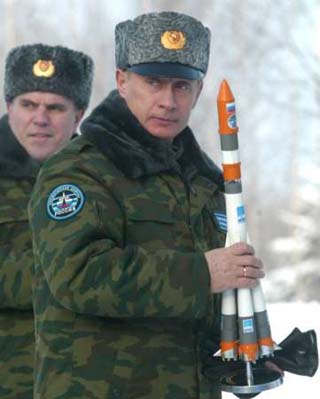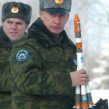
DOES PUTIN HAVE AN ARMS CONTROL AGENDA?
Publication: Eurasia Daily Monitor Volume: 4 Issue: 89
By:

The wave of loud protestations in the West against Russian President Vladimir Putin’s “moratorium” on implementing the Conventional Forces in Europe (CFE) Treaty (1990/1999) has temporarily subsided, as the concerned parties hope to receive clarifications on that unprecedented step at the May 10 meeting of the Russia-NATO Council. Yet any expectations that Moscow might reconsider its position are likely to be disappointed, since Russian officials on many occasions during the last few years have voiced their dissatisfaction about the “one-sided” CFE provisions (see EDM, May 2). There are, however, reasons to expect more success from making this issue part of a wider arms control agenda that would include Russia’s other concerns. Indeed, Putin expressed regret about the stalled international attention to disarmament in his 2006 address to the parliament, remembered mostly for the “Comrade Wolf” remark; he returned again to the disarmament theme in the “Munich” speech this February that shocked the select audience more by his abrasive tone than the rather thin substance (Gazeta.ru, February 15).
Many Western experts have argued for taking Putin at his word and re-launching a series of arms control talks (Economist, February 15; New York Times, May 3). There are indeed many challenging “hard security” issues that demand sustained attention: from the partially abandoned limitations on strategic delivery systems and warheads to the non-existent control of tactical nuclear weapons to the controversial deployment of strategic defense elements. Perhaps Putin indeed seeks to engage the United States in serious negotiations despite the Bush administration’s well-known aversion to binding commitments? The initiative announced in Washington last Friday, May 4, on setting the “two plus two” format where U.S. and Russian foreign and defense ministers would be able to tackle a range of disarmament issues will test this proposition, but a closer look at these issues is not very encouraging (Kommersant, May 5).
As U.S. Defense Secretary Robert Gates found out during his recent visit to Moscow, there is little interest in discussing possible cooperation in building a strategic defense system (Vremya novostei, April 24). The stream of accusations from the Kremlin that the planned deployment of radars and interceptor-missiles in Poland and the Czech Republic “will radically change the situation concerning defense and security in Europe” goes far beyond the borders of strategic common sense, but it appears to have the desired effect, as the U.S. Congress has refused to allocate funds for that rather ill-conceived step (Lenta.ru, May 4). Exacerbating the tensions inside the Atlantic Alliance appears to be the only point for Moscow in debating this deployment, so Sergei Ivanov, first deputy prime minister and the current favorite in the race of presidential hopefuls, rejoiced that this problem was “elegantly dumped into the OSCE basket” (Kommersant, April 27). Putin’s idea to discuss the U.S. strategic defense initiative at the Organization for Security and Cooperation in Europe, an institution that he has characterized as a “vulgar instrument” with a “bureaucratic apparatus that is absolutely not connected with the state founders in any way” is really nothing short of a mockery.
Moscow has shown neither true concern about the expiring START I treaty nor any inclination to address the long-neglected problem of tactical nuclear weapons. Since the February 2005 Bratislava summit between Bush and Putin, the issue of access to Russia’s nuclear facilities has become increasingly sensitive, and the veil of secrecy around Russian nuclear projects is now drawn with demonstrative determination. Earlier this year Ingjerd Kroken, a Norwegian Defense Ministry official supervising the Arctic Military Environmental Cooperation program, was refused entry to Russia and accused of nuclear espionage (Aftenposten, April 18). Moscow has not threatened to withdraw from the INF Treaty (1987) in its recent outburst of self-assertive statements, but this entirely counter-productive step has not been ruled out (Nezavisimoe voennoe obozrenie, March 2).
As for the CFE Treaty, despite U.S. readiness to include it on the agenda of possible talks, there appears to be slim chance — at best — to dissuade Moscow from abandoning this arrangement typically described as “detrimental” for Russia’s security interests (Rossiiskaya gazeta, May 5). Putin’s condition for lifting his “moratorium” — ratification of the treaty by all NATO member-states without exception — is designed to be impossible to meet, since the Baltic states could hardly be persuaded to join it, particularly in the poisonous atmosphere of the ongoing Russian-Estonian quarrel.
What makes it difficult to believe there is any real content behind Putin’s proclaimed devotion to disarmament is the absence of any qualified negotiators in his team, unlike in Soviet times, when first-class military and civilian experts were involved in preparing the proposals and hammering out compromises. This explains embarrassing mistakes in Putin’s recent statements, such as mixing up Slovakia and Slovenia in the CFE context or describing the Pershing as a “cruise missile” (RIA-Novosti, April 27). He is certainly far more precise in discussing the gas business in Europe, but the recently appointed Defense Minister Anatoly Serdyukov is yet to complete his prep course on strategic deterrence.
It is not just the lack of expertise that explains Putin’s assessment of the “real threat” emanating from the Baltic states’ non-participation in the CFE or assertion that ten interceptor-missiles in Poland would constitute “nuclear strategic weapons systems” and so their deployment would trigger a full-blown “missile crisis” similar to the one in the early 1980s. Pavel Podvig, a Russian expert universally respected for his balanced opinions, wrote on his blog recently, “This kind of rhetoric is just plain irresponsible” (Russianforces.org, April 27). It is indeed extremely unhelpful from an arms control point of view — but entirely logical from the perspective of Russian domestic politics.
The main intrigue in the Kremlin is not about elections, which to all appearances are going to be not quite free and fair even by Zimbabwean standards, it is about the transfer of power to a new “absolute arbiter.” Putin controls this ruse by postponing the choice, but the competing clans of his courtiers are already at one another throats, so he has to prevent the fratricide as well as patricide. Inventing an external threat is a method he cannot afford to ignore but arms control clearly does not fit this game plan.




